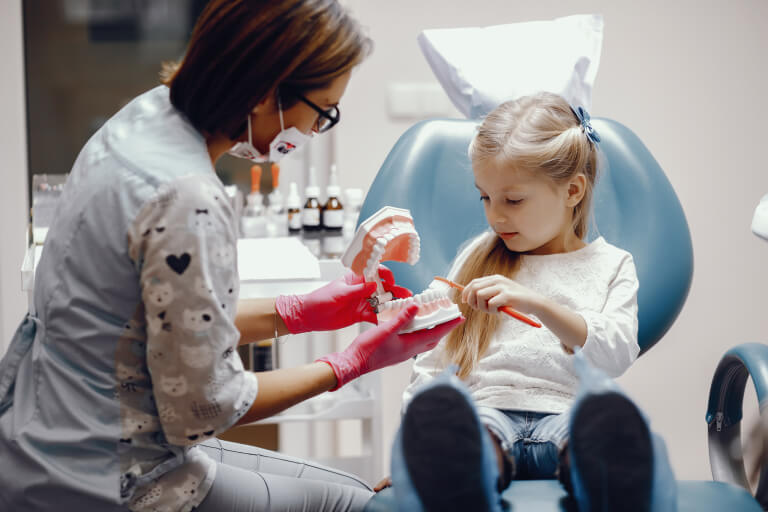An important turning point in a child’s health journey is their first dental appointment, which lays the groundwork for lifelong good oral hygiene and a favorable attitude toward dental care. Many parents might be unsure what to anticipate and when to arrange this first visit. Recognizing its significance helps allay worries and guarantee a positive experience for both the parent and the child.
When Should a Child’s First Dental Visit Occur?
According to the American Academy of Pediatric Dentistry (AAPD), children should see a dentist around their first birthday or within six months of the eruption of their first tooth. These visits are crucial for identifying possible problems and teaching parents about good dental hygiene practices, even though they may seem early.
The “baby teeth,” also known as primary teeth, are important for a child’s growth. They help with speech development, chewing, and keeping room for permanent teeth. Early dental care helps guarantee that these teeth remain strong and healthy until they fall out independently.
The Objectives of the First Visit
The child’s first dental appointment is an opportunity to build rapport with the dentist and create a positive dental experience, not merely to have their teeth examined. The following are the main goals of this first visit:
Evaluating Oral Development
The dentist will examine the child’s teeth, gums, jaw, and bite to ensure everything is growing normally. They will search for early indications of gum disease, tooth decay, or other anomalies.
Educating Parents
Parents are instructed on basic dental hygiene procedures, such as how to clean a baby’s teeth and gums, the value of fluoride, and cavity prevention techniques. The dentist could also discuss how food and bad habits like thumb-sucking affect dental health.
Preventing Dental Anxiety
Early exposure to the dental office setting can help a child feel less anxious and afraid. A good initial impression can influence subsequent visits and guarantee that your child has a favorable attitude toward dental care as they age.
Establishing Preventive Care
It’s always better to prevent than to treat. Beginning with the initial appointment, routine examinations enable the dentist to monitor dental health and take action before small concerns worsen.
What to Expect During the Visit
Usually, the initial dentist appointment is brief and simple. Dentists use this chance to acquaint the child with the surroundings while minimizing anxiety. This is what typically occurs:
- Introduction to the Office: As the youngster becomes familiar with the dental chair, equipment, and personnel, a friendly environment is created.
- Examination: The dentist carefully inspects the child’s mouth, gums, and teeth. If the child is extremely young, the exam may be conducted with the youngster sitting on the parent’s lap.
- Discussion with Parents: In addition to answering any queries parents might have, the dentist offers tailored guidance depending on the child’s oral health.
- Preventive Measures: Depending on the child’s age and oral health, the dentist may suggest fluoride treatment or apply a protective sealant to lower the chance of cavities.
The Benefits of Early Dental Visits
Preventing Tooth Decay
One of the most prevalent long-term illnesses affecting children is tooth decay. Early dental checkups detect and treat decay early on, ensuring that the child’s teeth stay healthy.
Building Healthy Habits
Early dental visits help kids understand the value of consistent dental care. When combined with proper dental hygiene practices at home, these visits set the foundation for healthy behaviors that last a lifetime.
Monitoring Growth and Development
The dentist can detect possible alignment or bite problems early. By addressing these issues in youth, more involved treatments, including braces, can be avoided later.
Promoting Overall Health
There is a strong correlation between general health and oral health. Children lower their risk of infections and other issues that could compromise their general health by keeping their teeth and gums healthy.
Tips for a Successful First Visit
To ensure the first dental visit goes smoothly, parents can take the following steps:
Choose a Pediatric Dentist: Pediatric dentists are educated to treat children’s special needs, which makes the encounter more pleasant and comfortable.
Prepare the Child: Use straightforward and comforting language to have a pleasant conversation with your child about the appointment. Don’t bring up unpleasant memories or use terms like “pain” or “hurt.”
Schedule Strategically: Make the appointment in the morning, when the child is often well-rested and in a positive frame of mind.
Be a Role Model: Exhibit a favorable attitude about dental care and practice proper oral hygiene at home.
Common Concerns Addressed
Many parents worry about their children’s oral health even before the first visit. The dentist can address concerns such as:
- Teething Pain: Providing tips to soothe discomfort during teething.
- Thumb Sucking: Advising on managing this habit to prevent long-term effects on dental alignment.
- Dietary Choices: Offering guidance on tooth-friendly foods and drinks.
Conclusion
An essential initial step in guaranteeing a child’s oral health and general well-being is their first dental appointment. By beginning early, parents may prevent dental problems, help their children develop a foundation of good behaviors, and cultivate a positive relationship with dental care that lasts a lifetime. Keep in mind that the objective is not only to take care of your child’s teeth but also to provide a positive experience that will lead to a lifetime of self-assured and healthy smiles.




